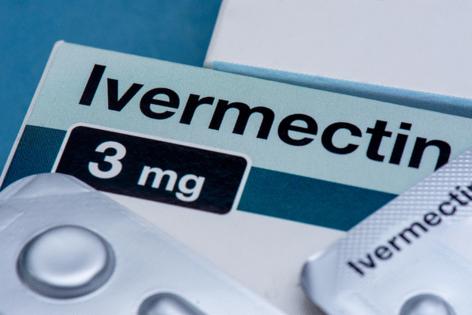North Carolina House votes to make it easier to get ivermectin, reigniting COVID controversy
Published in News & Features
RALEIGH, N.C. — A drug that gained international attention for its controversial off-label use during the COVID-19 pandemic could soon be available in North Carolina without a prescription.
House Bill 618, titled the “Ivermectin Access Act,” would require the state to issue a standing order by Oct. 1 allowing licensed pharmacists to dispense ivermectin for human use without a doctor’s prescription or consultation. The bill would also grant civil and criminal immunity to pharmacists who dispense the drug under the order. It would take effect immediately if signed into law.
The bill passed the state House on Wednesday in a 68–47 vote, mostly along party lines, with Republicans in support.
The vote came just ahead of Thursday’s deadline for most bills to clear one chamber. Republicans who voted against it were state Rep. Timothy Reeder, an emergency physician, and state Rep. Sarah Stevens, an attorney. Democratic state Rep. Pricey Harrison from Greensboro voted in favor.
It now heads to the state Senate, which will decide whether to take it up.
Prior to the vote, multiple Democrats spoke against the bill. State Rep. Tracy Clark of Greensboro proposed an amendment to continue requiring a prescription or consultation with a health care professional to get ivermectin.
“It is mind-boggling to me,” Clark said, “that here we are discussing the dispensing of ivermectin, an unproven, non-FDA-approved drug in pharmacies across our state, without a prescription, and protecting pharmacies from liability, from whatever will happen to people who take this dangerous drug.”
Clark said President Donald Trump “touted this drug to treat COVID against the advice of scientists and medical professionals across our country,” and she called Health and Human Services Secretary Robert F. Kennedy a “conspiracy theorist.” Kennedy has spoken in opposition to some vaccinations, suggested removing fluoride from water systems and more.
This and subsequent comments lead to multiple calls from GOP House members for Clark to stick to the topic of the amendment.
Early in the pandemic, Trump suggested the anti-malaria drugs chloroquine and hydroxychloroquine could help in the treatment of COVID-19. He also suggested chloroquine had U.S. Food and Drug Administration approval, which was not true at that point.
Shortly after, the FDA approved their emergency use, but revoked that authorization months later citing emerging scientific data.
Such conflicting developments during the pandemic likely contributed to the promotion of ivermectin by some as an alternative treatment, prompting public confusion and warnings from health agencies.
Committee hearings
Rep. Jonathan Almond, a Cabarrus County Republican and primary sponsor of the bill, said during a judiciary committee on Tuesday that ivermectin is often used without a prescription and should be more accessible.
It’s a “safe, affordable drug with minimal side effects,” Almond said, adding that other medications — such as Narcan — have made the move from prescription-only to over-the-counter.
This is “really about access, giving folks the ability to get a commonly used medication at a relatively low cost,” he said. Almond emphasized that ivermectin would not be stocked on store shelves but would be dispensed only with pharmacist approval.
Almond said three states — Idaho, Arkansas and Tennessee — have already enacted similar laws, and 14 others have bills moving through the legislative process.
Discovered in Japan in 1970, ivermectin was first developed as a veterinary drug to treat parasites. It was later approved for human use for certain parasitic infections and skin conditions like rosacea.
The FDA has not approved ivermectin for preventing or treating COVID-19. While early lab studies showed high concentrations of the drug could affect the virus, those results didn’t translate to success in rigorous clinical trials, including those published in The New England Journal of Medicine.
The FDA says no clinical trial data supports its effectiveness against the virus. The agency has also warned against using veterinary formulations in humans, citing untested ingredients and the danger of incorrect dosing.
Reported side effects of ivermectin include muscle pain, joint stiffness and swollen lymph nodes. Less common but more serious reactions include black, tarry stools, mouth ulcers and seizures.
State Rep. Marcia Morey, a Durham Democrat, criticized the bill during the committee, citing concerns over safety and the lack of federal approval.
“There is a risk of multiple side effects. Dosage is very important,” Morey said. “And I just find it incredulous — here we are in Judiciary 3 substituting our judgment for medical doctors and the FDA. I have not heard a reason why we’re thinking our judgment is superior to medical professionals’.”
State Rep. Keith Kidwell, a Chocowinity Republican and a member of the House Freedom Caucus, spoke in support of the bill, saying he knew “a number of people personally who took ivermectin during COVID and felt immediate relief.”
Three people also spoke in favor of the bill during a Tuesday committee meeting. Two said they took ivermectin to treat COVID-19.
One said she received the drug from a holistic practitioner after her insurance would not cover it.
Another said she traveled out of state to obtain ivermectin and also bought a veterinary liquid version to use as a preventive measure before international travel. She said she miscalculated the dosage, overdosed, and experienced sensory issues for several hours.
_____
©2025 The Charlotte Observer. Visit charlotteobserver.com. Distributed by Tribune Content Agency, LLC.







Comments